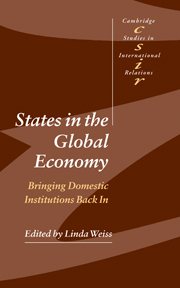Book contents
- Frontmatter
- Contents
- List of figures
- List of tables
- List of contributors
- Preface
- 1 Introduction: bringing domestic institutions back in
- Part I The resilience of welfare states
- Part II New economic challenges, changing state capacities
- 5 France: a new ‘capitalism of voice’?
- 6 The challenges of economic upgrading in liberalising Thailand
- 7 Building institutional capacity for China's new economic opening
- 8 New regimes, new capacities: the politics of telecommunications nationalisation and liberalisation
- 9 Ideas, institutions, and interests in the shaping of telecommunications reform: Japan and the US
- 10 Diverse paths towards ‘the right institutions’: law, the state, and economic reform in East Asia
- Part III Governing globalisation
- List of references
- Index
- CAMBRIDGE STUDIES IN INTERNATIONAL RELATIONS
8 - New regimes, new capacities: the politics of telecommunications nationalisation and liberalisation
Published online by Cambridge University Press: 22 September 2009
- Frontmatter
- Contents
- List of figures
- List of tables
- List of contributors
- Preface
- 1 Introduction: bringing domestic institutions back in
- Part I The resilience of welfare states
- Part II New economic challenges, changing state capacities
- 5 France: a new ‘capitalism of voice’?
- 6 The challenges of economic upgrading in liberalising Thailand
- 7 Building institutional capacity for China's new economic opening
- 8 New regimes, new capacities: the politics of telecommunications nationalisation and liberalisation
- 9 Ideas, institutions, and interests in the shaping of telecommunications reform: Japan and the US
- 10 Diverse paths towards ‘the right institutions’: law, the state, and economic reform in East Asia
- Part III Governing globalisation
- List of references
- Index
- CAMBRIDGE STUDIES IN INTERNATIONAL RELATIONS
Summary
One of the most important and influential ideas of globalisation is that the capacity of states to govern is constrained and diminished by increased liberalisation and competitive markets. This chapter examines the validity of this claim through a comparative historical analysis of the role of the state in the telecommunications industry since the invention of the telephone. Telecommunications has been an extreme case of étatisation as it has experienced nationalisation almost all over the world. Starting in Europe as early as 1880, nationalisation spread across the globe, leaving the provision of telecommunications under private ownership in only a handful of countries, most notably the United States. Indeed, among the infrastructures of the modern world economy only the delivery of post was more étatist than telecommunications. This has changed drastically, however, since the 1980s, when the telecommunications industry experienced radical degrees of liberalisation, Europeanisation, and globalisation. Increasingly telecommunications equipment is traded on competitive rather than protectionist rules. Foreign direct investment in the sector is booming and global alliances have proliferated. Single national networks have been replaced by multiple and competing networks which may operate within traditional technologies (wire telephony) or new and competing technologies (e.g., internet telephony, mobile telephony, and cable telephony). These striking changes are especially evident in the Europeanisation of the telecommunications sector (Schneider et al. 1994; Schmidt 1997; Thatcher 1999; Levi-Faur 1999a).
- Type
- Chapter
- Information
- States in the Global EconomyBringing Domestic Institutions Back In, pp. 161 - 179Publisher: Cambridge University PressPrint publication year: 2003
- 7
- Cited by



